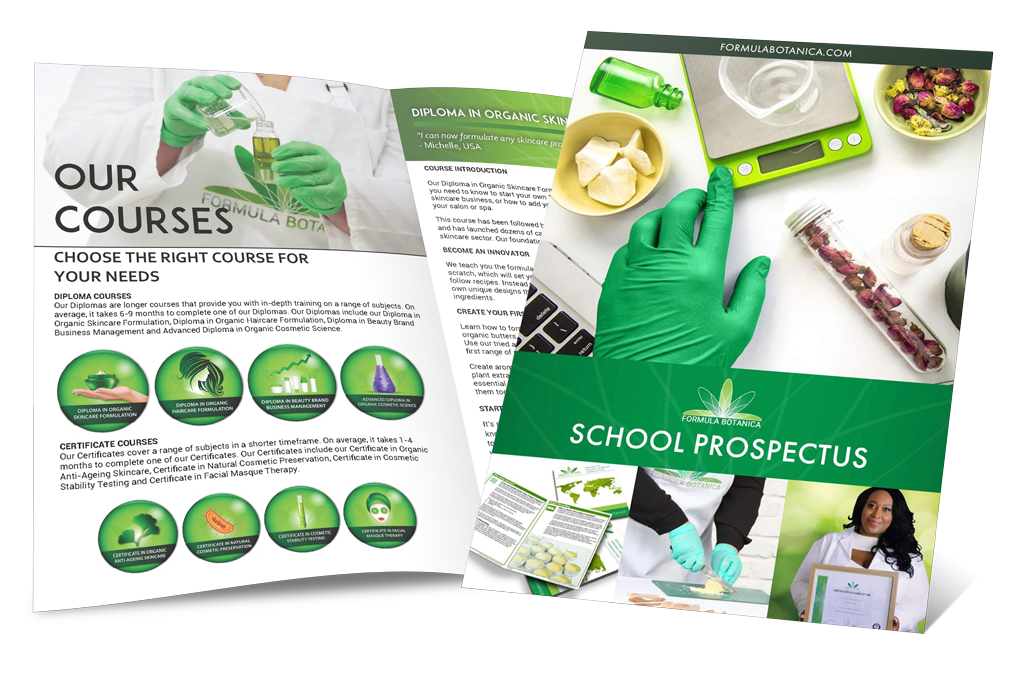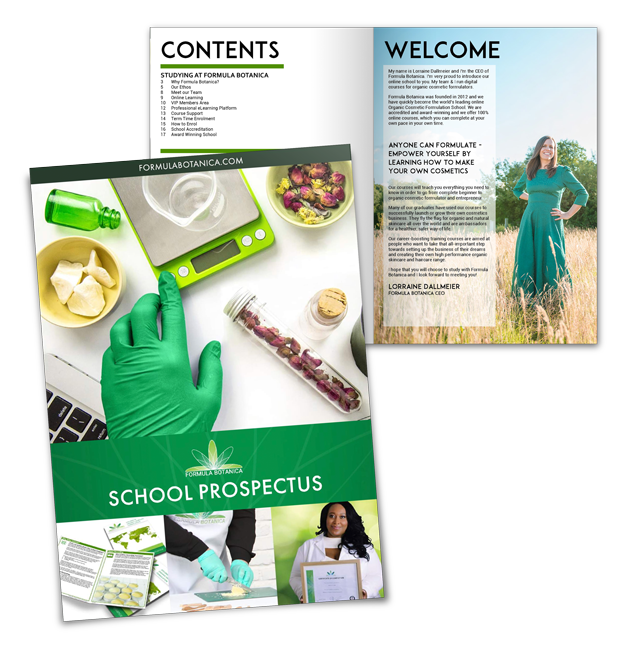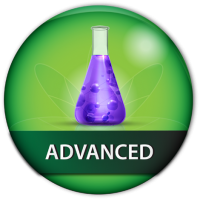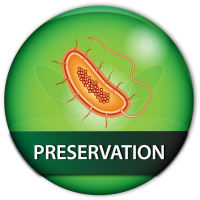Certificate in Cosmetic Stability Testing
Our online stability testing course will teach you how to design and outsource 20 different stability tests for your cosmetics range.
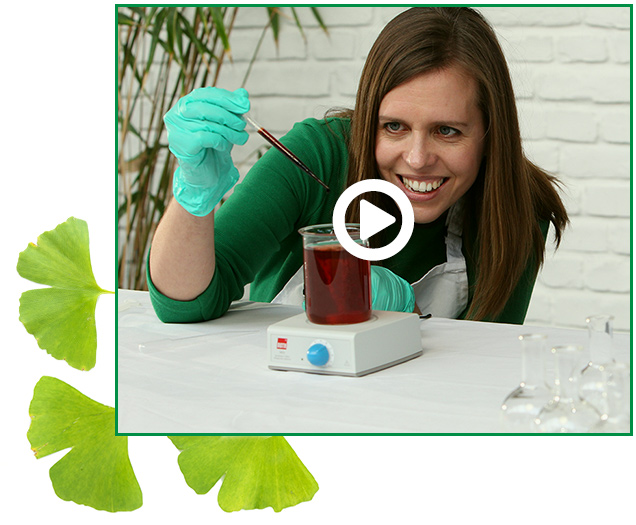
Suitable for: Formulators with experience
Pre-requisites: Checklist
Time: 20 study hours
Course Modules: 4
Coursework: Self-study + tutor graded
Cost: £295 (British Pounds)
Next enrolment period: No confirmed date
Enrolment opens in:
Enrolment closes in:
Our Certificate in Cosmetic Stability Testing will teach you how to design appropriate stability tests for your cosmetics range. In this online course, you’ll learn how to choose the right stability testing for your cosmetics and make sure that your products remain safe and stable for their shelf life.
This course is suitable for people with existing cosmetic brands or students with formulation experience. This Certificate will teach you how to make your cosmetics range safe, stable and sellable.
Learn how to perform Cosmetic Stability Tests
Learn the difference between physical, chemical, mechanical, microbiological and functional stability tests. You don’t need to equip your lab with expensive testing kit in order to undertake a sensible stability test. Discover which tests you can easily and inexpensively perform in your artisan cosmetics lab in order to ensure that your products are stable and sellable.
Learn the 20 different stability tests every formulator should know
We cover 20 different cosmetic stability tests that you can either undertake yourself, or outsource to a specialist lab. We’ll show you which tests you need for different formulations and we’ll teach you to undertake most of them yourself.
Accurately Predict your Cosmetic Shelf Life
Do you know how long your cosmetic product will last? Many artisan formulators have an approximate idea, but few can state with confidence what the shelf life of their products will be. Take the guesswork out of your calculations by actually understanding how to design a stability study and predict an accurate shelf life for your products.
Create a regular cosmetic stability testing schedule
When you formulate cosmetic products, you need to implement a testing schedule to regularly check the stability of your products. Whether you create your products fresh to order, or create batches in advance, learn how to prepare a regular testing schedule to ensure that you know what to look for in changes in your products. Cover all the environmental factors that could cause changes and choose the best tests to monitor these changes.
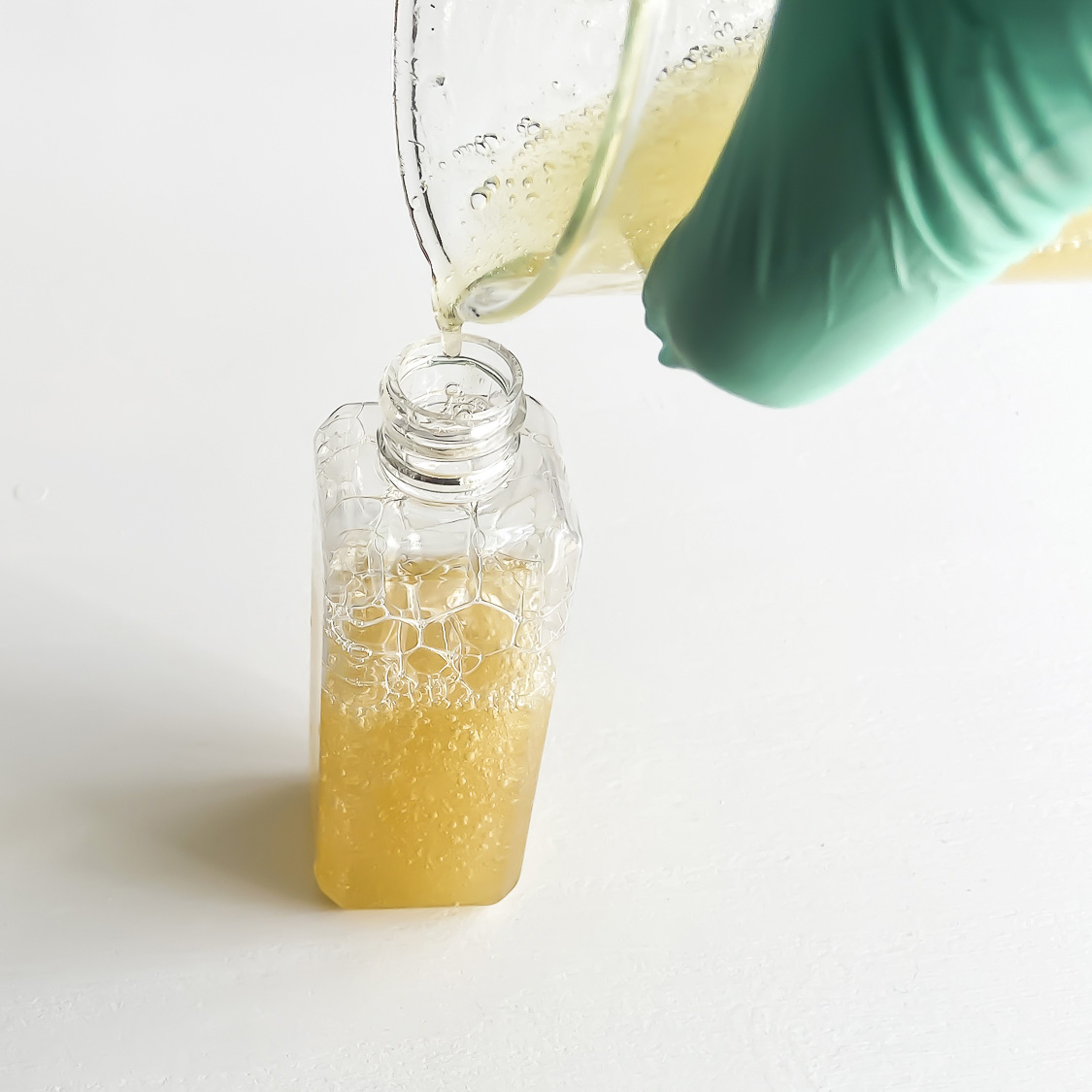
Why enrol with Formula Botanica?
This course is for you if:
“I have just completed my Stability Certificate at Formula Botanica. And I just have to say: Yet again you did Formula Botanica! Stability testing can at time feel overwhelming and difficult, but you have made it less difficult and at least manageable for this artisan formulator. You have helped me understand things I didn’t even now I needed to know.”
– Carola, Sweden
Course videos
Learn directly from the Formula Botanica team with our professional videos and course lectures.
Fun Online Games
Play games to help you learn how to reinforce the learning outcomes for your course.
Study books
Download your beautifully designed course notes to refer back to and keep forever.
Tutor Support
Speak directly to a tutor in our private “Ask the Tutor” forum for students.
Sequential Learning
Unlock new modules as you work through the course sequentially to enforce learning points.
Graded Coursework
Receive expert graded feedback to help you make your formulations safe, stable and sellable.
Module 1
Why test for stability?
Many artisan cosmetic formulators don’t regularly test the stability of their products. You’ll learn why stability testing is critical to the success of your business, we’ll look at the damage that could potentially be done to your reputation if you sold unstable products and we’ll review the legal requirements for stability.
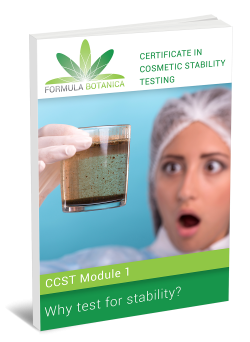
CCST Module 1
Why test for stability?
- Learn what it means to have a stable cosmetic product – avoid the nightmare of precipitated pigments, suspended particles, separated emulsions in 2 or 3 phases, discolouration or changed viscosity.
- Change your business ethos by embedding stability into the core of everything you do – we’ll teach you how.
- When is cosmetic stability testing a legal requirement? We’ll run you through the scenarios you must consider to keep your products safe and legal.
- Run through the 9 main reasons that you need to test for cosmetic stability in your products.
Module 2
Setting up your Lab
Mainstream cosmetics laboratories contain tens of thousands of dollars worth of testing equipment. As an artisan formulator, you need to rely on simpler equipment which is still effective. Run through the main requirements for your artisan cosmetics lab, so that you can still run a comprehensive regular testing schedule.
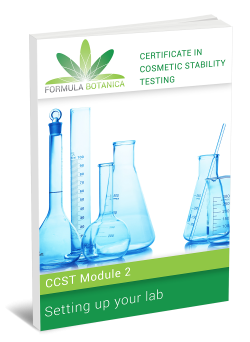
CCST Module 2
Setting up your Lab
- Make sure you have the 12 most important pieces of (affordable) equipment for your artisan cosmetics lab. We’ll teach you what they are, how they work and how to use them.
- Learn how to set up your testing lab on an artisan budget.
- Understand how to set up your artisan cosmetics lab so that you are ready to undertake your stability testing schedule for your own products.
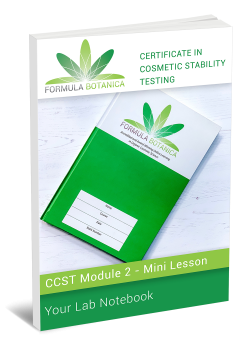
Mini Lesson
Your Lab Notebook
- Learn how to set up the most important piece of equipment in your testing lab: your notebook
- Understand how to set up your notebook
- Study which parameters you must record in your notebook
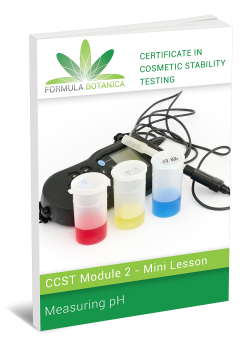
Mini Lesson
Measuring pH
- Understand what pH is, why you should measure it and which tools you can use.
- Learn how to use a pH meter – how to create solutions, how to calibrate your pH meter, how to store it.
- Study the 4 important points you must consider when using a pH meter.
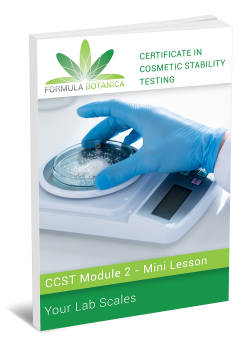
Mini Lesson
Your Lab Scales
- Research the 4 points you must consider when shopping for the right scales for your artisan lab
- Understand what defines good quality scales for your testing lab
Module 3
Choosing the Right Stability Test
Depending on the product you’re formulating, as well as its ingredients, packaging and overall efficacy, you will need to determine which stability test is most suitable. We’ll run through the huge variety of tests available to you and help you learn how to conduct them confidently and properly.
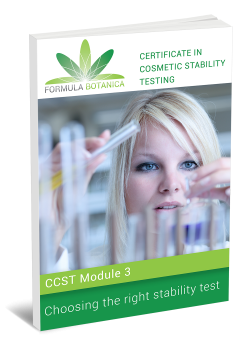
CCST Module 3
Choosing the Right Stability Test
- Learn the 20 different types of stability test available to you as an artisan cosmetics formulator. Learn why, when and how to undertake them, as well as understanding when you can perform these tests yourself or when you need to outsource them.
- Receive sample testing schedules, which you can modify for your own products and your own stability testing regime.
- Understand which tests are mandatory and which are good practice.
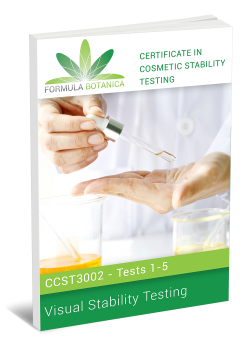
CCST 3002
Visual Stability Testing
- Learn the 5 characteristics of visual stability testing and how to conduct visual stability tests.
- Understand how to interpret the results of visual stability tests.
- Bonus: Sample testing schedule for visual stability tests
- Bonus: Record sheets for visual stability tests
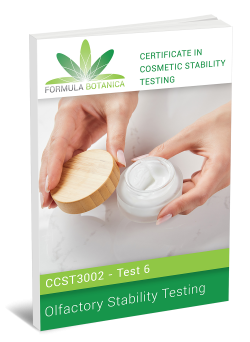
CCST 3002
Olfactory Stability Testing
- Learn how to conduct olfactory stability tests.
- Understand how to interpret the results of olfactory stability tests.
- Bonus: Sample testing schedule for olfactory stability tests
- Bonus: Record sheets for olfactory stability tests
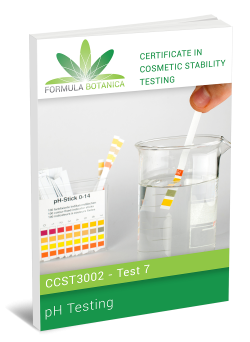
CCST 3002
pH Testing
- Learn the where, what, how and when of conducting pH tests.
- Understand how to interpret the results of pH tests.
- Bonus: Sample stability testing schedule for pH tests
- Bonus: Record sheets for pH tests
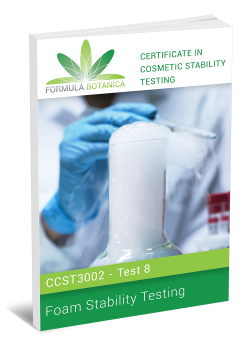
CCST 3002
Foam Stability Testing
- Learn the 5 characteristics of foam stability testing and how to conduct foam stability tests.
- Understand how to interpret the results of foam stability tests.
- Bonus: Sample testing schedule for foam stability tests
- Bonus: Record sheets for foam stability tests
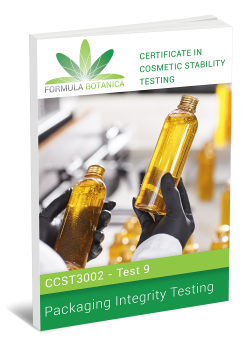
CCST 3002
Packaging Integrity Testing
- Learn how to conduct packaging integrity testing.
- Understand how to interpret the results of packaging integrity tests.
- Bonus: Sample testing schedule for packaging integrity tests
- Bonus: Record sheets for packaging integrity tests
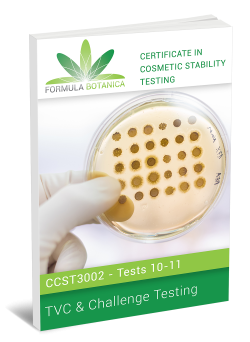
CCST 3002
Challenge Testing
- Learn the different between Total Viable Count (TVC) and challenge tests – which you must outsource to an external lab.
- Understand how to interpret the results of TVC and challenge tests.
- Bonus: Sample stability testing schedule for external TVC and challenge tests
- Bonus: Record sheets for TVC and challenge tests
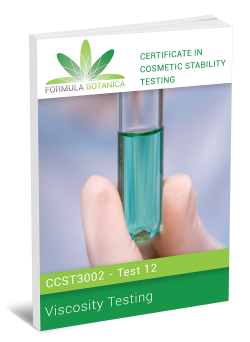
CCST 3002
Viscosity Testing
- Learn how to conduct viscosity challenge tests in your artisan lab (with a fun experiment!).
- Understand how to interpret the results of viscosity tests.
- Bonus: Sample testing schedule for viscosity tests
- Bonus: Record sheets for viscosity tests
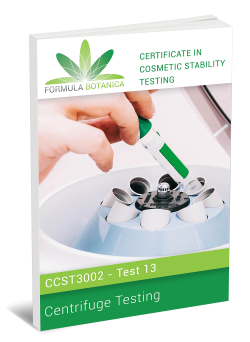
CCST 3002
Centrifuge Testing
- Learn how to conduct centrifuge testing.
- Understand how to interpret the results of centrifuge tests.
- Bonus: Record sheets for centrifuge tests
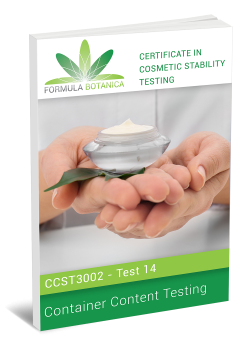
CCST 3002
Container Content Testing
- Learn how to conduct container content testing.
- Understand how to interpret the results of container content tests.
- Bonus: Sample stability testing schedule for container content tests
- Bonus: Record sheets for container content tests
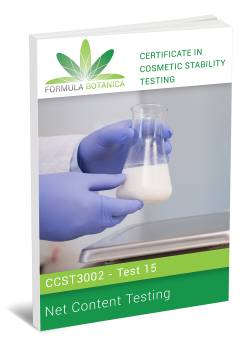
CCST 3002
Net Content Testing
- Learn how to conduct net content tests in your artisan lab.
- Understand how to interpret the results of net content tests.
- Bonus: Sample testing schedule for net content tests
- Bonus: Record sheets for net content tests
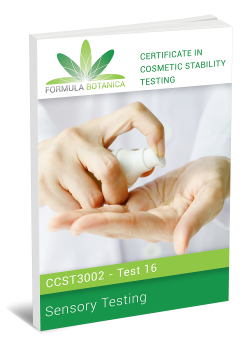
CCST 3002
Sensory Testing
- Learn how to conduct sensory / skin feel testing.
- Understand how to interpret the results of sensory / skin feel tests.
- Bonus: Sample testing schedule for sensory / skin feel tests.
- Bonus: Record sheets for sensory / skin feel tests
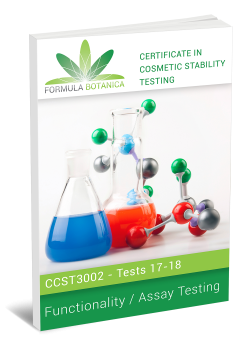
CCST 3002
Functionality / Assay Testing
- Learn the different between functionality and assay tests – which you must outsource to an external lab.
- Understand how to interpret the results of functionality / assay tests.
- Bonus: Sample stability testing schedule for external functionality and assay tests
- Bonus: Record sheets for functionality and assay tests
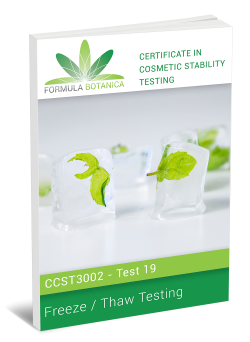
CCST 3002
Freeze / Thaw Testing
- Learn how to conduct freeze / thaw tests in your artisan lab.
- Understand how to interpret the results of freeze / thaw tests.
- Bonus: Sample testing schedule for freeze / thaw tests
- Bonus: Record sheets for freeze / thaw tests
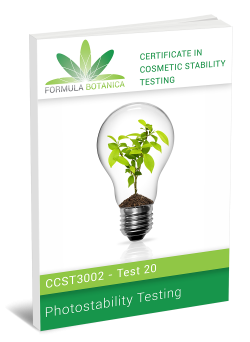
CCST 3002
Photostability Testing
- Learn how to conduct photostability testing.
- Understand how to interpret the results of photostability tests.
- Bonus: Sample testing schedule for photostability tests.
- Bonus: Sample photostability test report.
- Bonus: Record sheets for centrifuge tests
Module 4
Determining Shelf Life
The two most important objectives of running stability tests are (1) ensuring that the product is stable and (2) determining the shelf life of your product. In this module we will show you how to use your stability test results to set a sensible shelf life for your product and ensure that it remains stable for this duration.
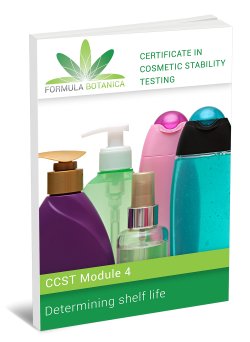
CCST Module 4
Determining Shelf Life
- Learn how to intrapolate the results of your stability tests and measurements in order to calculate your product’s shelf life.
- Understand how to plan your batch sizes and packaging, as well as how to label your products correctly to display their shelf life.
- Study the differences in global temperatures and relative humidity and how this affects your products and their stability.
“I would absolutely recommend this course to anyone who is formulating their own skin care products. The course not only explains the importance and necessity of stability testing, it also shows you how to perform inexpensive stability testing in your own lab allowing you to perfect your products before you send them to a professional lab for final testing (which will save you a lot of $$$).”
– Patty Palumbo, USA
Course Bonuses
When you study with Formula Botanica, you become part of a close-knit international community of students and graduates all around the world. We support you all throughout your studies and beyond, and we give you access to our expert botanical skincare science and business files while you are enrolled on your courses.

Bonus 1
Become Part of the Loveliest Formulation Community on the Internet
Once you enrol with us, you are welcomed into our international student community groups which contain many thousands of our students and graduates from all over the world. Everyone knows each other and many of our students meet up in their respective countries to share information and formulate together.
In our groups you will receive expert tutor support and peer support. Ask questions, share photos, troubleshoot formulations. Celebrate your victories and get encouragement when you need it. You are never alone.
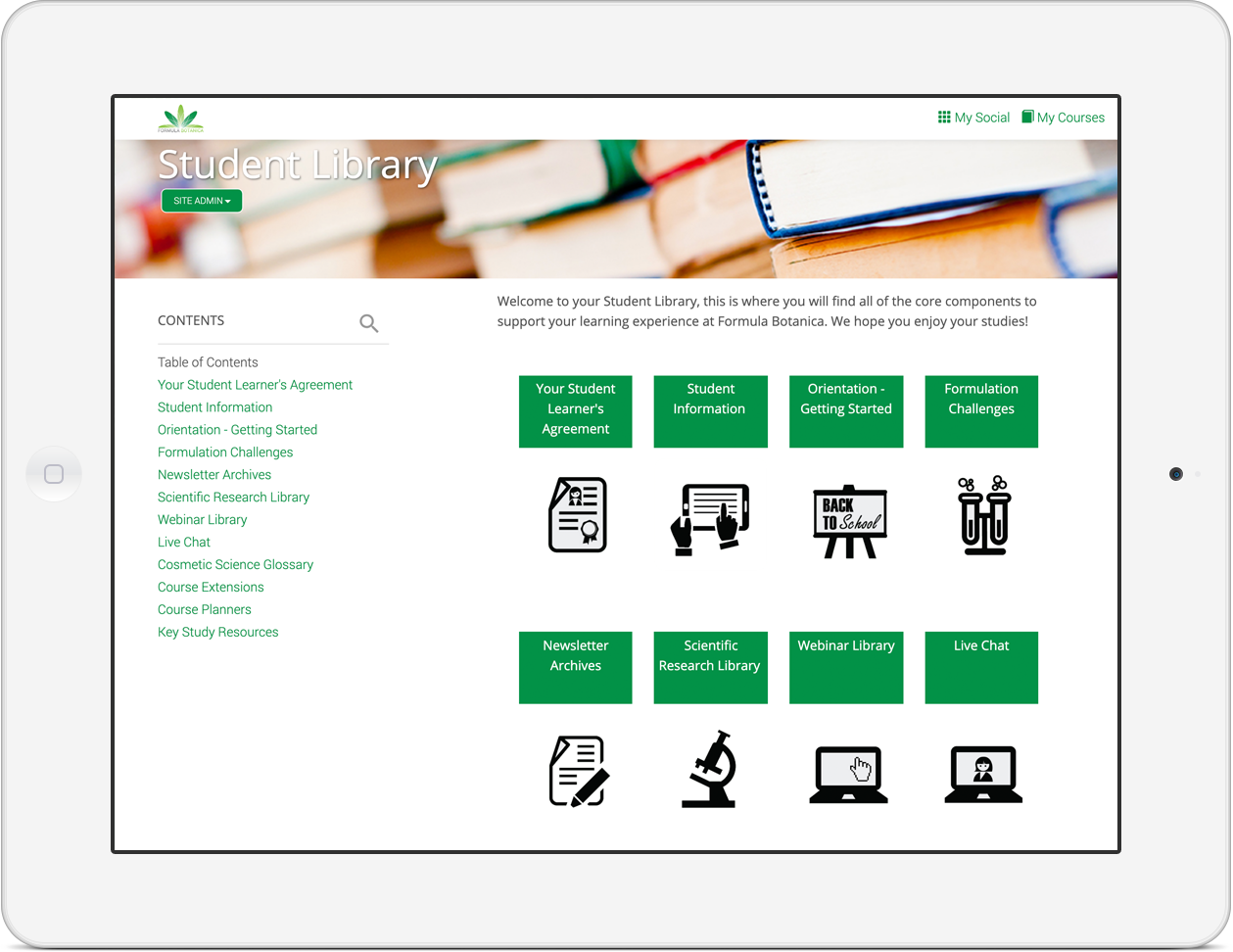
Bonus 2
Access our Student Library
When you become a student with Formula Botanica, you also gain exclusive access to our Student Resources Library for the duration of your course. Access our:
- Preferred supplier guide which contains hundreds of global companies
- Extensive ingredients directory with listings of over 100 natural ingredients
- Formulation percentage-to-weight calculator
- Scientific research collection
- Useful links section to additional resources
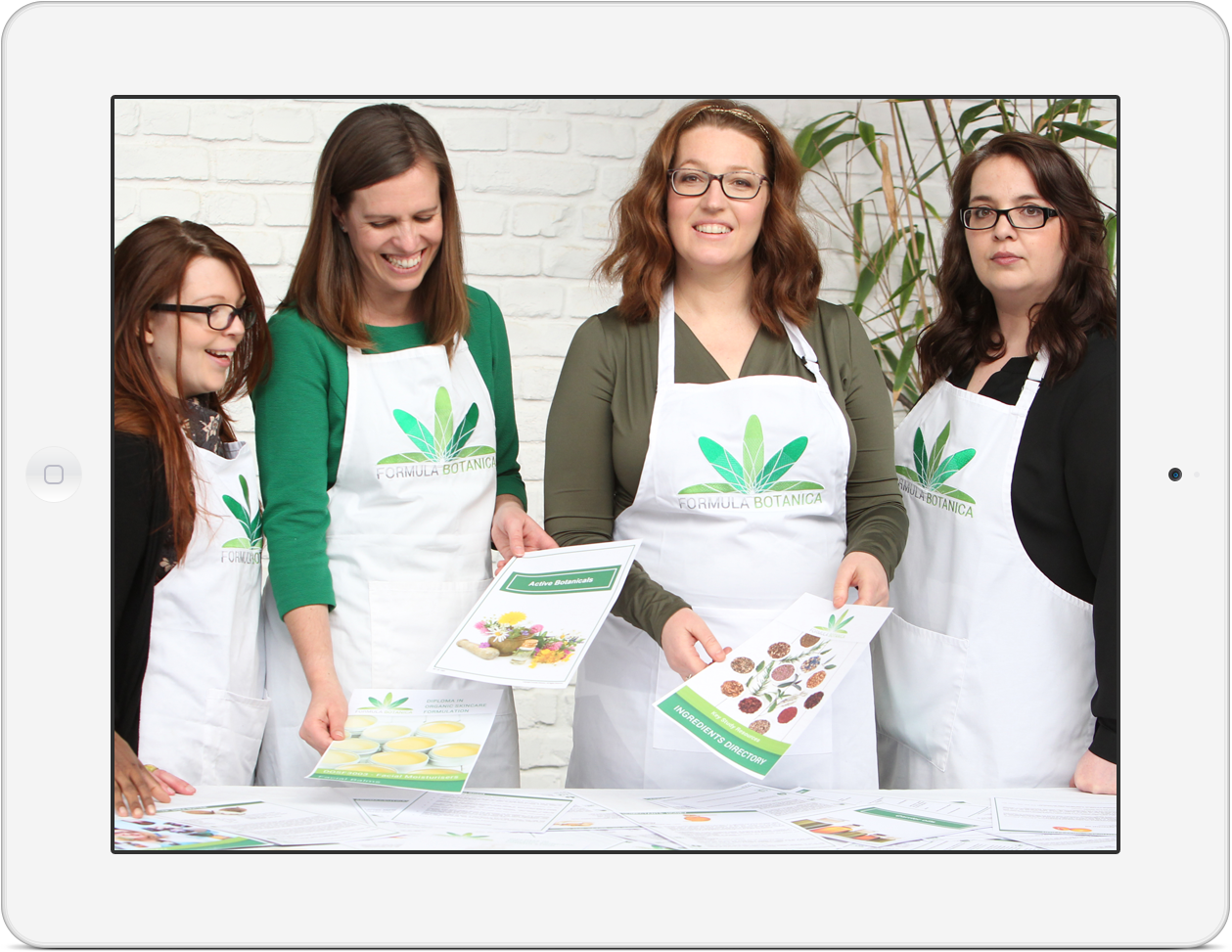
Bonus 3
Ongoing Support After Graduation
The support doesn’t finish when you graduate. We want to keep in touch with you once you’ve finished your course and support your career in organic skincare. We offer lots of free promotion for our graduates because we want to help give your business the support it needs when you launch it or as you grow it.
Be featured widely on our website, on social media and on our mailing list. Formula Botanica has many thousands of followers and subscribers all around the world so this will help you create a splash when you launch.
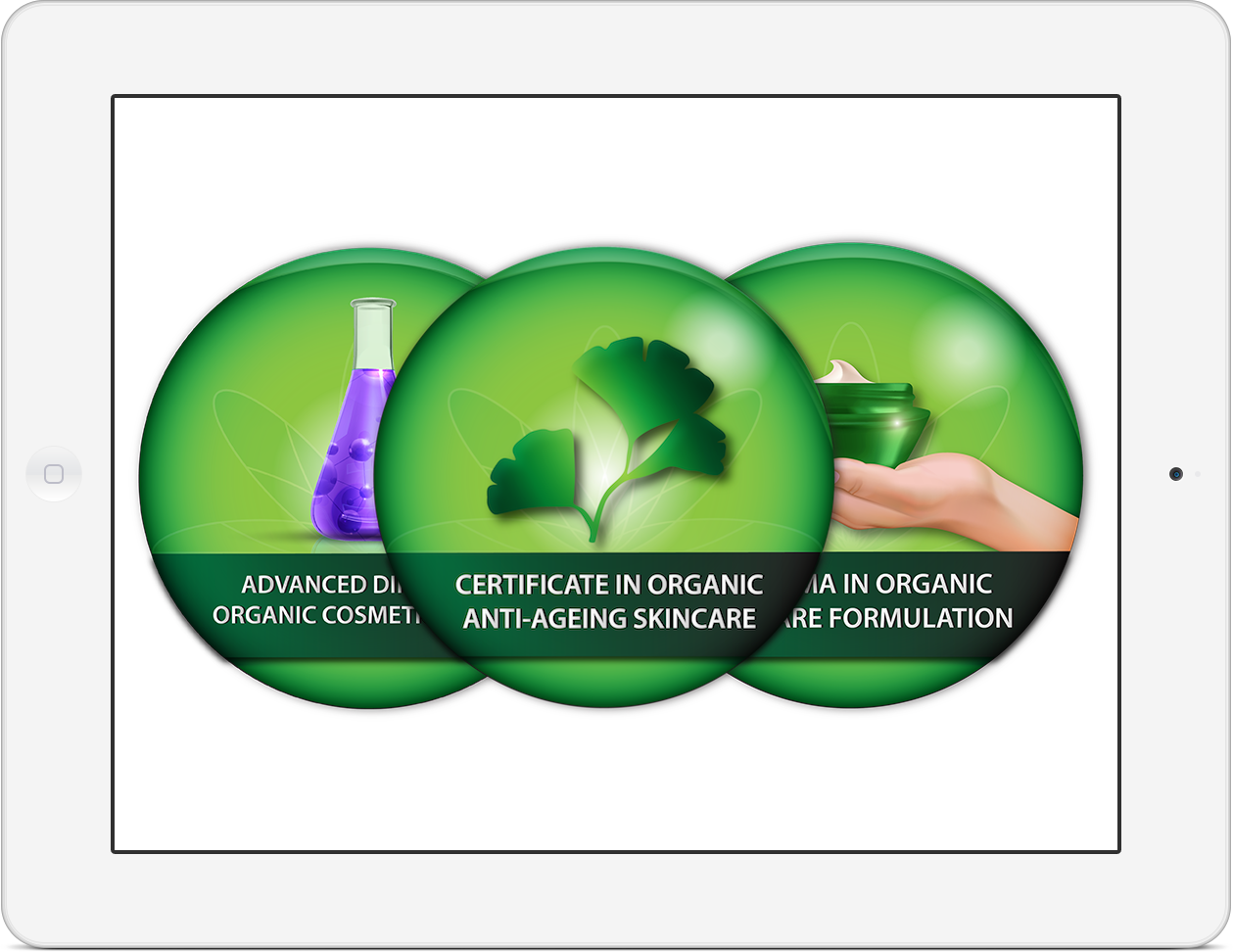
Bonus 4
Earn Formula Botanica Bonus Badges
Formula Botanica issues special Moodle Badges to students who pass their courses successfully (Moodle is the name of our award-winning and accredited eLearning Platform). These badges can be used on your resume, social media pages and LinkedIn profile to demonstrate that you are a skilled organic formulator. We have also hidden a few surprise badges in the course materials for students who pass certain Modules with a distinction grade!
Enrol for our Certificate in Cosmetic Stability Testing to learn one of the most important formulation skills – ensuring your products stay safe, stable and sellable.
Pre-enrol for our next termPrerequisites
Suitable for students with formulation experience, ideally graduates of our foundation Diploma.
Start Date
Term Times. Self-paced training where you have up to 12 months to complete your course.
Assessment
Projects, activities and reflexive learning. Each module ends with a short test.
Online Classroom
Peer support & tutor support via a private Facebook group.
Accreditation
Formula Botanica is accredited by the Open & Distance Learning Quality Council.
Expert Support
Our Tutor Team has an educational background in cosmetic chemistry, biology, education and business management. Let us support you.

Formula Botanica operates a term time system, so we can get all of our students started at the same time and run online study groups.
Term times run in the following months:
- Winter Term: January
- Summer Term: July
Enrolment for all of our courses will be open during this period. If you want to be the first to hear when we open enrolment, make sure you pre-register for this course.
Pre-enrol for our next term
